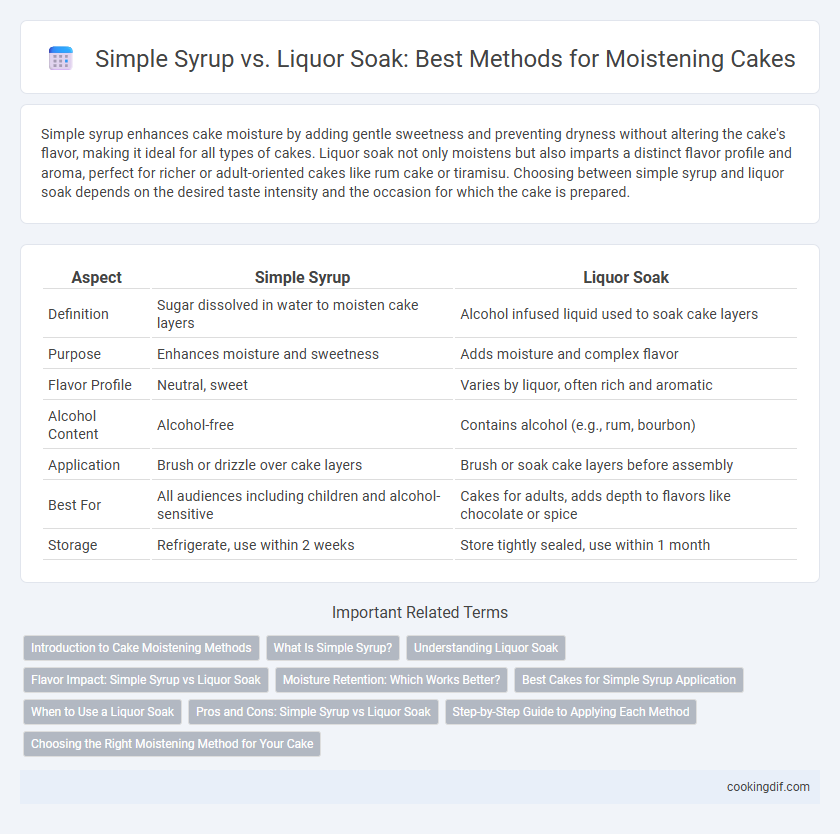Simple syrup enhances cake moisture by adding gentle sweetness and preventing dryness without altering the cake's flavor, making it ideal for all types of cakes. Liquor soak not only moistens but also imparts a distinct flavor profile and aroma, perfect for richer or adult-oriented cakes like rum cake or tiramisu. Choosing between simple syrup and liquor soak depends on the desired taste intensity and the occasion for which the cake is prepared.
Table of Comparison
| Aspect | Simple Syrup | Liquor Soak |
|---|---|---|
| Definition | Sugar dissolved in water to moisten cake layers | Alcohol infused liquid used to soak cake layers |
| Purpose | Enhances moisture and sweetness | Adds moisture and complex flavor |
| Flavor Profile | Neutral, sweet | Varies by liquor, often rich and aromatic |
| Alcohol Content | Alcohol-free | Contains alcohol (e.g., rum, bourbon) |
| Application | Brush or drizzle over cake layers | Brush or soak cake layers before assembly |
| Best For | All audiences including children and alcohol-sensitive | Cakes for adults, adds depth to flavors like chocolate or spice |
| Storage | Refrigerate, use within 2 weeks | Store tightly sealed, use within 1 month |
Introduction to Cake Moistening Methods
Simple syrup, a mixture of sugar and water, is commonly used to enhance cake moisture by evenly soaking the crumb and adding subtle sweetness without altering the flavor profile. Liquor soak, incorporating spirits like rum or brandy, imparts a distinctive flavor while simultaneously maintaining moisture levels, making it ideal for rich or fruit-based cakes. Both methods prevent dryness and extend freshness, with the choice depending on the desired taste intensity and audience preferences.
What Is Simple Syrup?
Simple syrup is a liquid sweetener made by dissolving sugar in water, commonly used to moisten cakes, enhancing both texture and flavor without altering the cake's structure. Unlike liquor soak, which adds distinct alcohol flavors and can affect the cake's density, simple syrup maintains a neutral sweetness while preventing dryness. Its versatility allows for easy customization by infusing flavors such as vanilla or citrus, making it an essential tool for achieving moist, tender cakes.
Understanding Liquor Soak
Liquor soak involves infusing cake layers with alcohol, such as rum or brandy, to enhance flavor depth and maintain moistness over time. The alcohol acts as a preservative while penetrating the crumb, offering a richer, more complex taste compared to simple syrup. Understanding the balance between alcohol content and soak time is crucial for achieving optimal moisture without overpowering the cake's natural flavors.
Flavor Impact: Simple Syrup vs Liquor Soak
Simple syrup enhances cake moistness with a subtle sweetness that complements most flavors without overpowering the dessert, making it ideal for delicate cakes. Liquor soak infuses the cake with rich, complex flavor profiles such as whiskey, rum, or brandy, adding depth and a sophisticated aroma that intensifies the overall taste experience. Choosing between simple syrup and liquor soak depends on the desired flavor impact, with simple syrup offering gentle moisture and liquor soak providing robust, layered nuances.
Moisture Retention: Which Works Better?
Simple syrup excels in moisture retention by evenly penetrating cake layers and preventing dryness, making it ideal for maintaining softness over time. Liquor soak adds flavor complexity but can evaporate quickly, potentially resulting in less sustained moisture compared to simple syrup. Studies on bake hydration show simple syrup achieves up to 20% higher moisture content retention than liquor-based soaks in similar cake types.
Best Cakes for Simple Syrup Application
Simple syrup is ideal for moistening cakes with tender crumb structures like sponge cakes, chiffon cakes, and angel food cakes, as it penetrates evenly without altering the flavor significantly. Cakes such as Victoria sponge and genoise benefit from simple syrup because it enhances moisture retention while keeping the delicate texture intact. Avoid liquor soaks for these cakes when a subtle sweetness and uniform moisture are desired, reserving them for richer, denser cakes like fruitcakes or rum cakes.
When to Use a Liquor Soak
A liquor soak is ideal for rich, dense cakes like fruitcakes or rum cakes, where the alcohol enhances flavor while providing deep moisture. Use liquor soaks when aiming to infuse layers with complex, mature notes that simple syrup cannot achieve. Cakes meant for adult occasions or special celebrations benefit most from the robust, aromatic qualities imparted by a liquor soak.
Pros and Cons: Simple Syrup vs Liquor Soak
Simple syrup enhances cake moisture with a neutral sweetness that evenly penetrates crumb structure, ensuring consistent hydration without altering flavor profiles. Liquor soak adds complex aromas and depth, complementing certain cake types like fruitcakes, though it can overpower delicate flavors and is unsuitable for children or non-drinkers. Simple syrup offers versatility and dietary inclusivity, whereas liquor soak provides gourmet sophistication at the cost of broader appeal.
Step-by-Step Guide to Applying Each Method
To moisten cakes effectively, begin with simple syrup by boiling equal parts sugar and water until dissolved, then brush or pour it onto the cake layers evenly, allowing full absorption. For liquor soak, select a suitable spirit like rum or brandy, gently heat it to enhance flavor release, and apply with a brush or spoon to saturate the cake without over-wetting. Both methods require layering application and resting time for optimal moisture retention and flavor infusion.
Choosing the Right Moistening Method for Your Cake
Simple syrup provides a controlled, sweet moisture boost that enhances the cake's tenderness without altering its flavor profile, making it ideal for delicate or fruit-flavored cakes. Liquor soak adds complex, aromatic notes and preserves the cake longer, best suited for rich, dense cakes like rum or bourbon cakes that complement the alcohol's character. Selecting between simple syrup and liquor soak depends on the cake type, desired flavor intensity, and occasion, ensuring optimal moisture and taste balance.
Simple syrup vs Liquor soak for cake moistening Infographic

 cookingdif.com
cookingdif.com